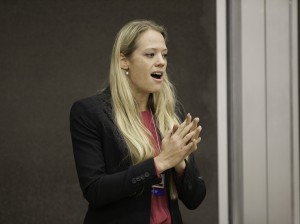Young women should seriously consider a career in engineering if they have a drive for learning how systems work and if they have a desire to make a difference, said Julie Crocket in her Education Week lecture Monday titled “Want your daughter to change the world? Consider engineering.”

Engineering is a diverse field that offers nearly unlimited job opportunities, according to Crocket, a professor of mechanical engineering at BYU specializing in fluid dynamics.
“Engineering is a great choice because you can love what you do, no matter what it is,” Crocket said. “There are so many great options when you get into the industry. Some will go on to design prosthetics, some will design phones and some will design planes.”
The gender diversity of engineers, however, usually lags far behind most professions; most sub-fields of the industry are comprised of about 90 percent men. Still, women are popular with employers, Crocket said, because they offer the same engineering skills with different personality strengths.
Biomedical and environmental engineering have double or triple the number of women than most other fields, Crocket said, partly because in those areas “you see that compassionate side of engineering coming out.”
Crocket said the key to her success as an engineer is due to not viewing the profession through an “either-or” lens.
“When I was little I would build things with Lego, and play with Barbies too – it doesn’t matter that I was playing with legos or with Barbies, but that I was building with legos or playing with barbies,” she said. “What mattered is that I loved creating, although I didn’t (call it that) at the time.”
Similarly, Crocket said, women shouldn’t feel torn between choosing a demanding course of study and planning for a family.
“It’s not mutually exclusive – it’s not that ‘because engineering was really hard, I can’t focus on raising a family.’ That’s not it at all,” Crocket said. “There’s lots of ways to use your knowledge without actually working full time if that’s not what you want to do. There are lots of family friendly career options.”
Crocket told parents not to discourage their daughters from their interest in a traditionally male-dominated field, but rather to 1) provide learning opportunities and 2) help their daughter to find a mentor – of either sex – who can tell them and show them what the career is like.
“Encourage your daughter to explore,” Crocket said. “If there are things you don’t (understand about engineering), be comfortable learning with them and helping them where you can.”
Lastly, Crocket said young women interested in the field need to shed their fears and try learning more about the discipline itself before making up their mind one way or the other.
“When you’re outside of your comfort zone, that’s when great things start to happen. That’s when you start to grow,” Crocket said. “If you’re doing what you love, you’ll fit right in.”




